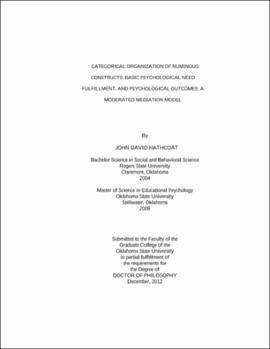| dc.contributor.advisor | Fuqua, Dale | |
| dc.contributor.author | Hathcoat, John David | |
| dc.date.accessioned | 2013-11-26T08:27:40Z | |
| dc.date.available | 2013-11-26T08:27:40Z | |
| dc.date.issued | 2012-12 | |
| dc.identifier.uri | https://hdl.handle.net/11244/6947 | |
| dc.description.abstract | Scope and Method of Study: Numerous efforts have been made to understand the often observed association among numinous constructs and positive psychological outcomes. Identification of third variable effects is problematized by both a general dearth of theoretical guidance and conceptual ambiguity in the operationalization of numinous measures. The present study utilized self-determination theory and a categorization of numinous constructs aligned with the multilevel paradigm to frame model specification. According to self-determination theorists' basic psychological need fulfillment constitutes a path toward positive psychological outcomes. However, the multi-level paradigm suggests that numinous measures may be divided according their substantive and functional characteristics. This led to two proposals that were examined within the current study. First, two simple mediation models were examined utilizing the presence of meaning in life and satisfaction with life as outcome variables. These models specified that the effect of substantive religiosity (i.e. religious commitment) on these outcomes were mediated by basic psychological need fulfillment (i.e. religious/spiritual self-mastery). It was further predicted that the effect of substantive religiosity on basic psychological need fulfillment would be moderated by measures of functional religiosity. Faith development, as conceived by James Fowler (1981), was utilized as an indicator of functional religiosity. A convenient sample of 651 undergraduate students completed a battery of measures as indicators of the specified model. | |
| dc.description.abstract | Findings and Conclusions: A normal theory and bootstrapping procedure both supported a simple mediation model, wherein the effect of religious commitment on the presence of meaning in life was mediated by religious/spiritual self-mastery. Statistical criteria failed to fully support a similar model when using satisfaction with life as an outcome variable. A moderated mediation hypothesis was then examined when utilizing the presence of meaning in life as an outcome variable. Evidence supported faith development as a moderator of the path from religious commitment to self-mastery. Follow-up analyses indicated that the size of the indirect effect decreased as faith development scores increased. Results imply that greater attention should be given to the identification of contingencies in proposed third variable effects that aim to account for observed correlations. | |
| dc.format | application/pdf | |
| dc.language | en_US | |
| dc.rights | Copyright is held by the author who has granted the Oklahoma State University Library the non-exclusive right to share this material in its institutional repository. Contact Digital Library Services at lib-dls@okstate.edu or 405-744-9161 for the permission policy on the use, reproduction or distribution of this material. | |
| dc.title | Categorical organization of numinous constructs, basic psychological need fulfillment, and psychological outcomes: A moderated mediation model | |
| dc.contributor.committeeMember | Barnes, Laura | |
| dc.contributor.committeeMember | Perry, Katye | |
| dc.contributor.committeeMember | Montgomery, Diane | |
| osu.filename | Hathcoat_okstate_0664D_12383.pdf | |
| osu.accesstype | Open Access | |
| dc.type.genre | Dissertation | |
| dc.type.material | Text | |
| dc.subject.keywords | eudaimonic well-being | |
| dc.subject.keywords | life satisfaction | |
| dc.subject.keywords | moderated mediation | |
| dc.subject.keywords | presence of meaning | |
| dc.subject.keywords | self-determination theory | |
| dc.subject.keywords | su | |
| thesis.degree.discipline | Educational Psychology | |
| thesis.degree.grantor | Oklahoma State University | |
